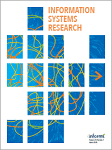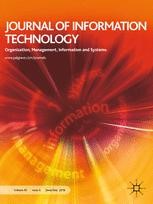|
European Journal of Information Systems |
|
| Information Systems research provides significant insight into how information technologies affect the strategic agility of firms. Most research to date has studied the responding element of agility at the expense of sensing. Further, extant research has mainly focused on how the sensing of formal and strong signals might influence agility. With the highly turbulent and fast-changing competitive landscape of the digital age, we argue for the need to expand the focus of this research to include examining how managers identify and make sense of weak signals, and how the sensing of weak signals influences digital-enabled strategic agility. Drawing on social network theory, this paper presents two streams of research and several research avenues that can stimulate and potentially guide research efforts on this topic. | |
 |
Information Systems Research |
| Password-based authentication is the most commonly used method for gaining access to secured systems. Unfortunately, empirical evidence highlights the fact that most passwords are significantly weak and encouraging users to create stronger passwords is a significant challenge. In this research, we propose a theoretically augmented password strength meter design that is guided by the Elaboration Likelihood Model of persuasion (ELM). We evaluate our design by leveraging three independent and complementary methods: a survey-based experiment using students to evaluate the saliency of our conceptual design (proof-of-concept), a controlled laboratory experiment conducted on Amazon MTurk to test the effectiveness of the proposed design (proof-of-value), and a randomized field experiment conducted in collaboration with an online forum in Asia to establish proof-of-use. In each study, we observe the changes in users’ behavior in response to our proposed password strength meter. We find that the ELM augmented password strength meter is significantly effective at addressing the challenges of password-based authentication. Users exposed to this strength meter are more likely to change their password, leading to a new password that is significantly stronger. Our findings suggest that the proposed design of augmented password strength meters is an effective method for promoting secure password behavior among end users. | |
 |
Journal of Information Technology |
| Artificial intelligence (AI) is beginning to transform traditional research practices in many areas. In this context, literature reviews stand out because they operate on large and rapidly growing volumes of documents, that is, partially structured (meta)data, and pervade almost every type of paper published in information systems research or related social science disciplines. To familiarize researchers with some of the recent trends in this area, we outline how AI can expedite individual steps of the literature review process. Considering that the use of AI in this context is in an early stage of development, we propose a comprehensive research agenda for AI-based literature reviews (AILRs) in our field. With this agenda, we would like to encourage design science research and a broader constructive discourse on shaping the future of AILRs in research. | |
 |
MIS Quarterly |
| Several online review platforms offer monetary incentives to motivate individuals to write reviews and keep them engaged with the platforms. While existing studies have examined the effects of completion-contingent monetary incentives (which uniformly reward users as long as they write reviews on the platform), we know little about the effectiveness of performance-contingent monetary incentives (which reward platform users based on the quality of their reviews). In this paper, we examine the effects of receiving performance-contingent rewards on users’ continued contribution in terms of the quantity, quality, and valence of the reviews they generate. We leverage a quasi-experiment research design to analyze a large dataset that we obtain through a collaboration with a large restaurant review platform in Asia. Our evidence shows that after receiving performance-contingent rewards, individuals write more reviews and write reviews that are of better quality. Interestingly, receiving rewards does not significantly affect the valence of subsequent reviews. Our study extends past research by being one of the first to examine how receiving performance-contingent rewards affects subsequent behaviors of reviewers. Our results can also guide platform managers to design efficient and effective incentive policies. | |
